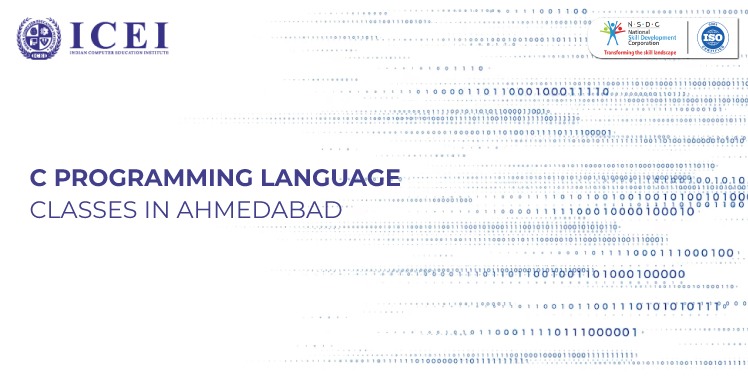
ICEI C Language Classes in Ahmedabad
C Programming Classes in Ahmedabad provided by ICEI consists entirely of practical training. Our C Training focuses on placement for everyone. We designed our course content and structure to provide basic to high level C Programming competence at the conclusion of our C Programming Classes in Ahmedabad. The syllabus of our C Language Training Courses will be sufficient to confidently appear for certification and interviews.
Learn C Programming by experts
We have highly certified and experienced tutors. Our C Trainers will assist you in developing your CV and will share their project experience with you.
Our C Training Center in Ahmedabad is well-equipped with all of the necessary amenities. When it comes to C Training Course fees, we provide the most affordable classes.
Why take C Language Classes in Ahmedabad?
The command of the programming language is crucial in securing the desired employment in a highly competitive industry. As a result, it is necessary to seize the information on C in order to think and grow logical and abstract thinking more effectively. Students must write their own programmes that have an impact on clients by the end of the programme.
How does ICEI train you?
- Each student is exposed to a practical, on-the-job situation for tackling real-world problems through live project implementation.
- Students will be job ready after completing the course if they learn through live project execution.
C Curriculum
- C programming history
- C programming basics
- C programming Structure
- Keyword and identifier
- Rules for identifiers
- Variable in C
- Declaration of variable
- Constants in C
- Real constant
- Integer constant
- Character constant
- String constant
- Functions – why?
- Declare and define a function.
- Invoke a function
- Scope of variables, local variables and function parameters
- Pointers, arrays and structures as function parameters
- Function result and return statement
- Void as a parameter, pointer and result
- Parameterizing the main function
- External function and the extern declarator
- Header files and their role
- Data types
- Floating point values in real life
- C, float literals
- Arithmetic operators
- Priority and binding
- Post- and pre -incrementation and -defragmentation
- Operators of type op=
- Char type and ASCII code, char literals
- Equivalence of int and char data
- Comparison operators
- Conditional execution and if keyword
- printf () function
- scanf () functions:
- Flow control
- Conditional execution continued: the “else” branch
- More integer and float types
- Conversions – why?
- Typecast and its operators
- Loops – while, do and for
- Controlling the loop execution with break and continue
- Logical and bitwise operators
- Managing input and output operations
- Arrays
- Switch: different faces of ‘if’
- why do you need vectors?
- Sorting in real life and sorting in a computer memory
- Initiators
- Pointers: another kind of data in “C”
- Simple pointer
- NULL pointer and operator
- Pointer’s arithmetic
- Pointers vs. arrays: different forms of the same phenomenon
- Using strings: basics
- Basic functions dedicated to string manipulation
- Memory management and structures
- The meaning of array indexing
- The usage of pointers: perils and disadvantages
- Void type
- Arrays of arrays and multidimensional arrays
- Memory allocation and memory deallocation with malloc () and free () functions
- Arrays of pointers vs. multidimensional arrays
- Structures – why?
- Declaring, using and initializing structures
- Pointers to structures and arrays of structures
- Basics of recursive data collections
- single character input
- Declaration of storage classes
- Types of storage classes
- Auto storage class
- Register storage class
- Static storage class
- External storage class
- Defining symbolic constants
- Volatile variable
- Types of operators
- Assignment
- Arithmetic
- Logical
- Relational
- Shorthand
- Unary
- Conditional
- Size of operator
- Type conversation
- Implicit conversation
- Explicit conversation
- Decision making
- Branching
- Control statements
- If statement
- If else statement
- Nested if statement
- Else if ladder statement
- Switch statement
- Break statement
- Iteration
- Type of Loops
- While loop
- Do while loop
- For loop
- Jumping statement
- Go To statement
- Break statement
- Continue statement